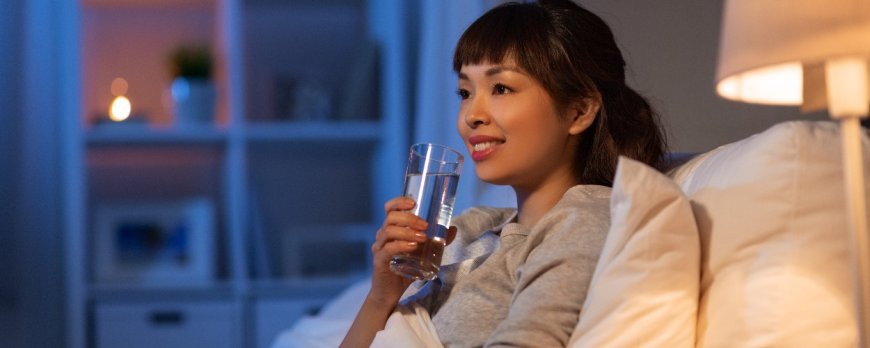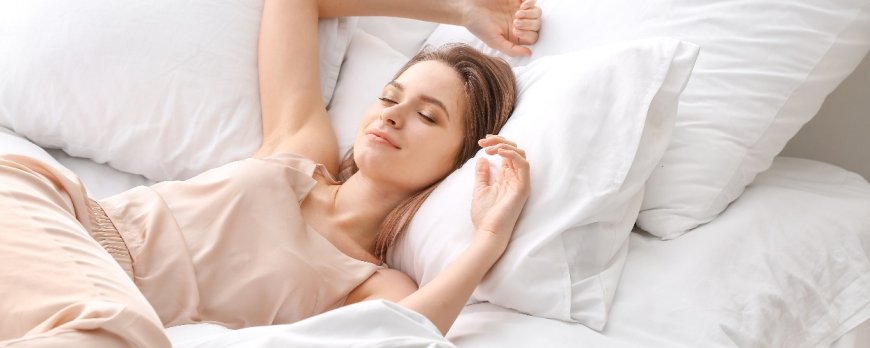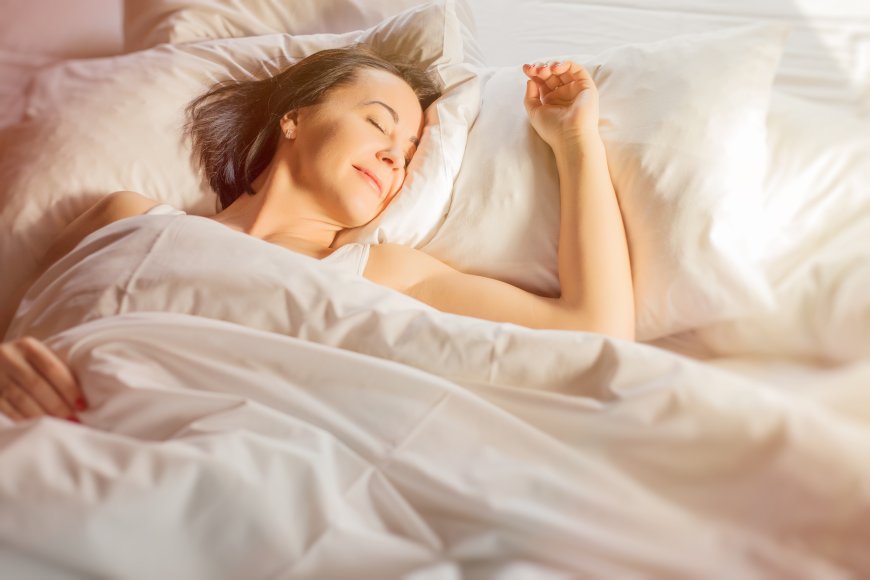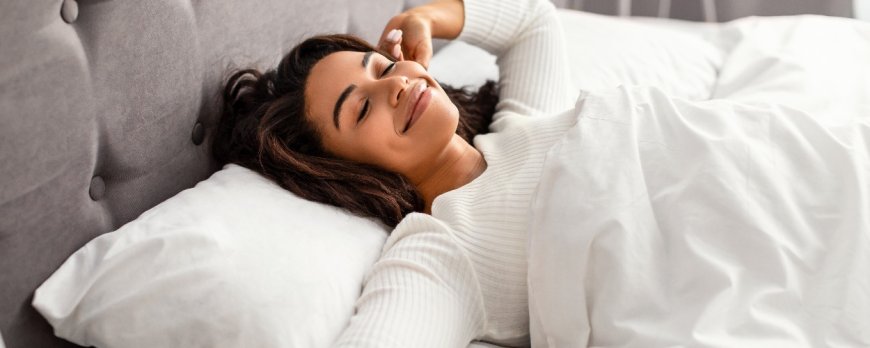Why am I so thirsty late at night?
Uncover the reasons behind "Why am I so thirsty late at night?" Explore health conditions, lifestyle factors, or medications causing late-night thirst.

Why am I so thirsty late at night?
Do you find yourself waking up feeling excessively thirsty late at night and wondering why?
If you consistently wake up feeling thirsty at night, there could be several possible reasons for this. The first possibility is that your sleeping environment may be contributing to your thirst. Sleeping in a cooler room and maintaining proper humidity levels can help prevent dryness and thirst. Dehydration could be another cause, so make sure you are drinking enough water throughout the day to stay properly hydrated. Certain medications, such as corticosteroids, antipsychotics, and antidepressants, can also cause thirst as a side effect. Excessive alcohol consumption can lead to dehydration and waking up thirsty as well. Sleep apnea, perimenopause or menopause, diabetes, Sjögren syndrome, anemia, and heart, kidney, or liver failure could all be potential underlying health conditions that contribute to nighttime thirst. It's important to consult with a healthcare provider if you frequently wake up thirsty or experience other concerning symptoms. They can help identify the cause and provide appropriate treatment. Lastly, poor sleep can also lead to dehydration, so it's important to maintain good sleep hygiene and address any sleep disorders that may be interfering with your rest.
Key Takeaways:
- Consistently waking up feeling thirsty at night may have various causes.
- A cooler sleeping environment and proper humidity levels can help prevent dryness and thirst.
- Dehydration can be a significant factor, so staying hydrated throughout the day is important.
- Medications, such as corticosteroids, antipsychotics, and antidepressants, can cause thirst as a side effect.
- Excessive alcohol consumption can lead to dehydration and waking up thirsty.

Environmental Factors and Hydration
Your sleeping environment and hydration levels play a crucial role in determining whether you wake up feeling dehydrated and thirsty at night. Here are a few factors to consider:
- Room temperature: Sleeping in a cooler room can help prevent excessive dryness and thirst. Adjust your thermostat to maintain a comfortable temperature, typically between 60 and 67 degrees Fahrenheit.
- Humidity levels: Low humidity can contribute to dehydration and increase nighttime thirst. Consider using a humidifier to add moisture to the air and help prevent dryness.
- Hydration throughout the day: Dehydration during sleep can lead to waking up feeling thirsty. Make sure you are drinking enough water throughout the day to stay properly hydrated. Aim for at least eight 8-ounce glasses of water per day.
If you experience nighttime thirst despite maintaining a suitable sleeping environment and staying hydrated, there could be other underlying causes. Certain medications, including corticosteroids, antipsychotics, and antidepressants, may have excessive thirst as a side effect. Additionally, excessive alcohol consumption can contribute to dehydration and waking up thirsty at night. If you suspect a medication or alcohol may be causing your nighttime thirst, consult with a healthcare provider.
Addressing any concerns
If you frequently wake up feeling dehydrated at night, it's essential to consult with a healthcare provider. They can help identify any underlying health conditions that may be contributing to your nighttime thirst. Conditions such as sleep apnea, perimenopause or menopause, diabetes, Sjögren syndrome, anemia, and heart, kidney, or liver failure could all be potential causes. Your healthcare provider can conduct tests, provide a proper diagnosis, and recommend appropriate treatment options tailored to your specific needs.
Lastly, poor sleep can also lead to dehydration and increased thirst. To maintain proper hydration levels, focus on good sleep hygiene. This includes creating a comfortable sleep environment, establishing a bedtime routine, and managing stress levels. If you suspect you have a sleep disorder such as sleep apnea, consult with a healthcare provider for further evaluation and treatment recommendations.
Medications and Thirst
If you're taking certain medications, they may be the culprits behind your excessive thirst while sleeping. Medications like corticosteroids, antipsychotics, and antidepressants can cause thirst as a side effect. These medications work by affecting various systems in the body, including the hormonal and neurotransmitter systems, which can disrupt the body's fluid balance and increase thirst.
If you suspect that your medications are causing your nighttime thirst, it is important to consult with your healthcare provider. They can review your medication regimen and determine if there are alternative options available that may have fewer side effects. It's important not to stop or adjust your medication without medical guidance.
In some cases, the benefits of the medication may outweigh the side effect of increased thirst. However, your healthcare provider may be able to provide recommendations or prescribe additional medication to help manage the excessive thirst. They will also be able to monitor your overall health and ensure that any underlying conditions are being properly managed.
Nocturnal Polydipsia
- Nocturnal Polydipsia, also known as excessive nighttime thirst, is a condition characterized by an increased desire to drink fluids during the night.
- This condition can be caused by a variety of factors, including excessive fluid intake during the day, certain medications, diabetes, and sleep disorders.
- If you suspect that you may be experiencing nocturnal polydipsia, it is important to consult with your healthcare provider for further evaluation and treatment options.
- Your healthcare provider may recommend lifestyle modifications, such as reducing fluid intake before bedtime, as well as addressing any underlying medical conditions that may be contributing to the excessive thirst.
- By working closely with your healthcare provider, you can identify the cause of your excessive thirst and develop a personalized treatment plan to help manage your symptoms and improve your overall well-being.
Remember, excessive thirst while sleeping can be a sign of an underlying medical condition, so it's important to seek professional medical advice. Your healthcare provider will be able to conduct a thorough evaluation and provide appropriate treatment options to address your specific needs.

Alcohol Consumption and Dehydration
The relationship between alcohol consumption and dehydration can lead to excessive thirst during nighttime. Alcohol is a diuretic, which means it increases urine production and can cause the body to lose fluids. When you consume alcohol, it inhibits the release of an antidiuretic hormone, resulting in increased urine production and fluid loss. This can leave you feeling dehydrated and waking up thirsty during the night.
To minimize the impact of alcohol on your hydration levels, it's important to practice moderation. Limit your alcohol consumption, especially before bedtime, to reduce the likelihood of experiencing excessive thirst. Additionally, you can take proactive steps to stay hydrated while consuming alcohol. Drink water or other non-alcoholic beverages alongside your alcoholic drinks to help maintain hydration levels.
Furthermore, it's important to note that excessive alcohol consumption can also lead to disrupted sleep patterns, which can further contribute to dehydration. Poor sleep quality can impair the body's ability to regulate fluid balance, leading to increased thirst. It's crucial to prioritize good sleep hygiene and address any underlying sleep disorders that may be impacting your rest.
Tips to minimize nighttime thirst caused by alcohol:
- Drink alcohol in moderation, especially before bedtime.
- Balance alcohol consumption with non-alcoholic beverages to maintain hydration levels.
- Ensure you have a comfortable sleep environment to promote better sleep quality.
- Address any sleep disorders, such as sleep apnea, that may be disrupting your sleep and contributing to dehydration.
- Stay well-hydrated throughout the day by drinking water and other hydrating fluids.
By being mindful of your alcohol consumption and taking steps to promote proper hydration and quality sleep, you can help minimize excessive thirst during nighttime and ensure your overall well-being.
Underlying Health Conditions
Nighttime thirst can be a symptom of underlying health conditions, including perimenopause or menopause, diabetes, and Sjögren syndrome. These conditions can disrupt the body's normal regulation of fluid balance, leading to increased thirst during the night.
Perimenopause or menopause, the natural transition in a woman's life, can cause hormonal fluctuations that contribute to nighttime thirst. These hormonal changes can affect fluid regulation and lead to increased fluid loss through sweating, resulting in a feeling of dehydration and increased thirst.
Diabetes, a condition characterized by high blood sugar levels, can also contribute to nighttime thirst. Elevated blood sugar levels can lead to frequent urination, causing the body to lose more fluid and leading to excessive thirst.
Sjögren syndrome, an autoimmune disorder, can affect the body's ability to produce moisture, leading to dry mouth and increased thirst. This condition often causes dryness in the eyes, nose, and throat as well.
Anemia, Heart Failure, Kidney Failure, and Liver Failure
In addition to perimenopause or menopause, diabetes, and Sjögren syndrome, other underlying health conditions could also contribute to nighttime thirst. Anemia, a condition characterized by a lack of red blood cells or hemoglobin, can affect the body's ability to transport oxygen and nutrients, leading to increased thirst.
Heart failure, kidney failure, and liver failure are conditions that can disrupt the body's fluid balance and result in fluid retention. This fluid retention can lead to increased thirst as the body tries to eliminate excess fluid.
It's important to note that nighttime thirst can be a symptom of these underlying health conditions, but it may also be accompanied by other symptoms. If you experience frequent nighttime thirst or have concerns about your health, it's crucial to consult with a healthcare provider for a proper diagnosis and appropriate treatment.
Importance of Consulting a Healthcare Provider
If you're consistently waking up thirsty late at night, it's crucial to consult with a healthcare provider to determine the underlying cause and find appropriate treatment. Thirst at night can be attributed to various factors, including sleeping environment, hydration levels, medications, alcohol consumption, and underlying health conditions. By seeking professional advice, you can gain a better understanding of the root cause of your nighttime thirst and receive necessary treatment.
Your healthcare provider will be able to conduct a thorough evaluation, taking into account your medical history, symptoms, and any potential risk factors. They will help you identify potential triggers for your excessive thirst, such as sleep disorders like sleep apnea or underlying health conditions like diabetes or kidney failure. With their expertise, they can provide tailored solutions and recommend appropriate lifestyle changes or prescribe medication if necessary.
It's important to remember that self-diagnosis or ignoring the issue can lead to further complications. Consulting with a healthcare provider will help ensure that you receive the most accurate diagnosis and effective treatment plan. They can offer guidance on maintaining proper hydration, managing underlying conditions, and improving your sleep hygiene to alleviate nighttime thirst and promote overall well-being.
Key Points:
- Consistently waking up thirsty at night may signal an underlying issue.
- Consulting with a healthcare provider is vital to determine the cause and find appropriate treatment.
- Thorough evaluation by a healthcare provider can identify sleep disorders, health conditions, or other factors contributing to nighttime thirst.
- Healthcare providers can provide tailored solutions, prescribe medication if necessary, and offer guidance on hydration and sleep hygiene.

The Impact of Poor Sleep on Hydration
Poor sleep can have a significant impact on your hydration levels, potentially contributing to nighttime thirst. When you don't get enough quality sleep, it can disrupt the body's natural hydration balance. Here are a few ways in which poor sleep can affect your hydration:
- Increased water loss: During sleep, your body naturally loses water through sweat and respiration. However, if your sleep is disturbed or you experience conditions like sleep apnea, this water loss may be increased. As a result, you may wake up feeling dehydrated and thirsty.
- Reduced fluid regulation: Adequate sleep is essential for the proper regulation of fluid balance in the body. Without enough sleep, your body may struggle to balance its fluid levels efficiently, leading to a higher risk of dehydration.
- Impaired kidney function: Sleep deprivation can also impair the function of your kidneys, which play a crucial role in maintaining hydration. When the kidneys don't work optimally, your body may have difficulty conserving water, leading to increased thirst.
To mitigate the impact of poor sleep on hydration, it's important to prioritize good sleep hygiene and address any underlying sleep disorders. Consider implementing the following practices:
- Create a comfortable sleep environment: Ensure your bedroom is cool, dark, and free from distractions to promote deep and uninterrupted sleep.
- Establish a bedtime routine: Develop a consistent routine leading up to bedtime to signal to your body that it's time to unwind and prepare for sleep. This can help improve the quality of your sleep and subsequently maintain proper hydration.
- Manage stress levels: High levels of stress can interfere with sleep quality and hydration. Engage in stress-reducing activities, such as meditation or gentle exercise, to promote better sleep and overall well-being.
- Seek professional help: If you suspect you may have a sleep disorder, such as sleep apnea, consult with a healthcare provider who can diagnose and provide appropriate treatment options. Addressing sleep disorders can greatly improve your hydration levels and reduce nighttime thirst.
By prioritizing good sleep hygiene and addressing any sleep disorders, you can enhance your sleep quality and maintain proper hydration levels, reducing the likelihood of waking up thirsty at night.
Addressing Sleep Disorders
Sleep disorders, such as sleep apnea, can disrupt your sleep and contribute to nighttime thirst. Sleep apnea is a condition characterized by pauses in breathing during sleep, which can lead to decreased oxygen levels in the body. This can cause the body to produce more urine and increase the likelihood of dehydration. If you suspect that sleep apnea is causing your nighttime thirst, it's essential to seek medical attention.
Addressing sleep disorders like sleep apnea may involve various treatment options. Continuous positive airway pressure (CPAP) therapy is a common treatment for sleep apnea. It involves wearing a mask over your nose or mouth while you sleep, which delivers a continuous flow of air to keep your airways open. Other alternatives, such as oral appliances or lifestyle changes, may also be recommended depending on the severity of your condition.
If you have been diagnosed with sleep apnea or suspect you may have it, it's important to follow your healthcare provider's recommendations. Treating sleep apnea can not only help alleviate nighttime thirst but also improve your overall sleep quality and reduce the risk of associated health complications.
Maintaining Proper Sleep Hygiene
Practicing good sleep hygiene can help reduce nighttime thirst and promote overall well-being. Here are some tips to incorporate into your routine:
- Keep your bedroom cool and well-ventilated to prevent excessive dryness. This can help minimize nighttime thirst.
- Avoid consuming large amounts of fluids close to bedtime to prevent the need for frequent trips to the bathroom, which can disrupt your sleep.
- Create a relaxing bedtime routine that includes activities such as reading a book or taking a warm bath. This can signal to your body that it is time to wind down and prepare for sleep.
- Establish a consistent sleep schedule by going to bed and waking up at the same time every day. This helps regulate your body's internal clock and promotes better sleep quality.
- Limit exposure to electronic devices, such as smartphones and tablets, before bed. The blue light emitted by these devices can interfere with the production of melatonin, a hormone that helps regulate sleep.
Addressing Sleep Disorders
If you suspect that a sleep disorder, such as sleep apnea, may be contributing to your nighttime thirst, it is important to seek professional help. A healthcare provider can diagnose and treat any underlying sleep disorders, which may help alleviate symptoms of thirst and improve overall sleep quality.
By practicing good sleep hygiene and addressing any potential underlying causes of nighttime thirst, you can enhance your sleep quality and wake up feeling refreshed and hydrated.
Conclusion
Understanding the reasons behind your excessive thirst late at night is crucial for maintaining your overall health and well-being. If you consistently wake up feeling thirsty, there could be several possible causes that you should consider. It's important to evaluate your sleeping environment and make necessary adjustments, such as keeping the room cooler and maintaining proper humidity levels to prevent dryness and thirst.
Dehydration can also be a contributing factor, so make sure you are drinking enough water throughout the day to stay properly hydrated. Additionally, certain medications like corticosteroids, antipsychotics, and antidepressants can cause thirst as a side effect. Being mindful of your medication's potential effects can help you understand why you may be waking up thirsty at night.
Excessive alcohol consumption can lead to dehydration and waking up thirsty as well. It's important to moderate your alcohol intake and be aware of its impact on your hydration levels. Furthermore, there are several underlying health conditions, such as sleep apnea, perimenopause or menopause, diabetes, Sjögren syndrome, anemia, and heart, kidney, or liver failure, that can contribute to nighttime thirst. If you frequently experience excessive thirst or other concerning symptoms, it is advisable to consult with a healthcare provider who can identify the cause and provide appropriate treatment.
Lastly, poor sleep can also lead to dehydration, emphasizing the importance of maintaining good sleep hygiene and addressing any sleep disorders that may be impacting your rest. By adopting healthy sleep habits and seeking treatment if necessary, you can reduce the likelihood of waking up thirsty at night and improve your overall sleep quality.
FAQ
Q: Why am I consistently waking up feeling thirsty at night?
A: There could be several possible reasons for this, including your sleeping environment, dehydration, certain medications, excessive alcohol consumption, underlying health conditions, poor sleep, and sleep disorders. It's important to consult with a healthcare provider to determine the cause and receive appropriate treatment.
Q: How can my sleeping environment contribute to nighttime thirst?
A: Sleeping in a cooler room and maintaining proper humidity levels can help prevent dryness and thirst. Ensure that your sleeping environment is comfortable and conducive to a restful sleep.
Q: Can dehydration cause nighttime thirst?
A: Yes, dehydration can be a cause of waking up feeling thirsty at night. Make sure you are drinking enough water throughout the day to stay properly hydrated.
Q: Can certain medications cause nighttime thirst?
A: Yes, medications such as corticosteroids, antipsychotics, and antidepressants can cause thirst as a side effect. If you suspect your medication may be contributing to your nighttime thirst, consult with your healthcare provider.
Q: Does excessive alcohol consumption contribute to waking up thirsty at night?
A: Yes, excessive alcohol consumption can lead to dehydration and waking up thirsty. It's important to moderate your alcohol intake and stay hydrated while drinking.
Q: What underlying health conditions can contribute to nighttime thirst?
A: Conditions such as sleep apnea, perimenopause or menopause, diabetes, Sjögren syndrome, anemia, and heart, kidney, or liver failure could all be potential underlying health conditions that contribute to nighttime thirst. Consulting with a healthcare provider can help identify any underlying conditions.
Q: When should I consult a healthcare provider about my nighttime thirst?
A: If you frequently wake up thirsty at night or experience other concerning symptoms, it's important to consult with a healthcare provider. They can help identify the cause of your nighttime thirst and provide appropriate treatment.
Q: Can poor sleep lead to dehydration?
A: Yes, poor sleep can contribute to dehydration. It's important to maintain good sleep hygiene and address any sleep disorders that may be interfering with your rest.
Q: How can sleep disorders contribute to nighttime thirst?
A: Sleep apnea is a common sleep disorder that can lead to dehydration and nighttime thirst. Seeking treatment for sleep disorders can help alleviate this symptom.
Q: What can I do to maintain proper sleep hygiene?
A: To minimize nighttime thirst, it's important to practice good sleep hygiene. This includes creating a comfortable sleep environment, establishing a bedtime routine, and managing stress levels.































































































































